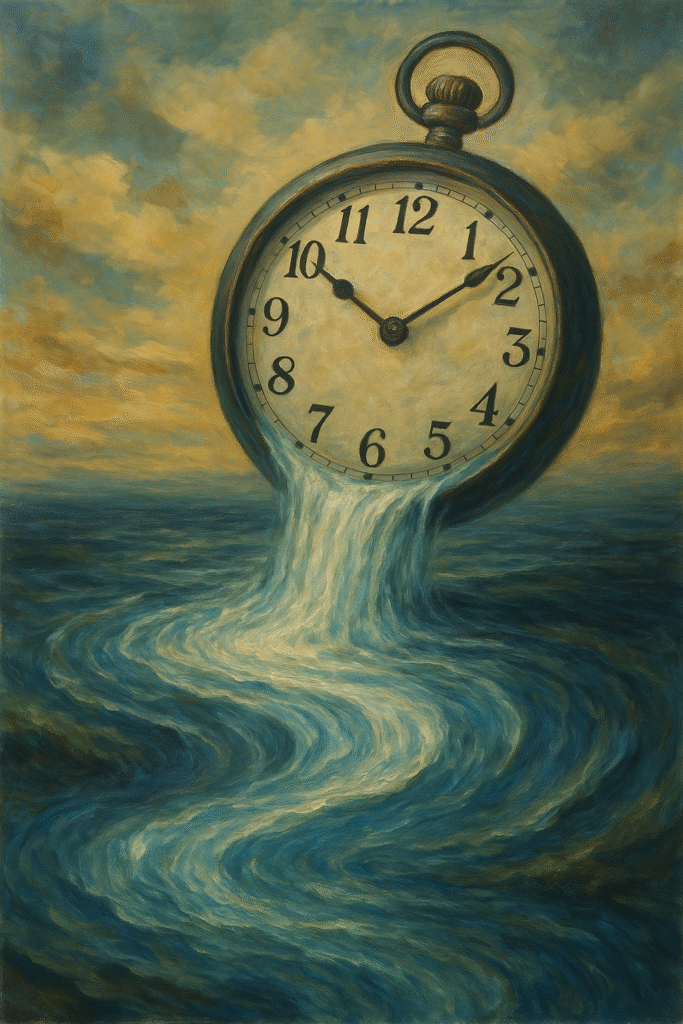Does Time Really Flow Like Water? In every culture, the passage of time remains a universally understood concept. However, perceptions of time can vary dramatically across different societies, suggesting a rich tapestry of interpretations and metaphors woven into the fabric of human understanding. A particularly evocative metaphor, “Time flows like water,” provokes curiosity about its cultural universality. To explore this, we delve into how this metaphor resonates across cultures, uncovering layers of meaning and perception unique to each society.
Time as a Universal Concept Time is a central pillar in the architecture of human societies, helping to structure daily life and cultural rituals while guiding interactions and planning. Despite its ubiquity, how different societies conceptualize time can vary. At the heart of this diversity is the notion of universal time concepts, which suggests every society has a structure for measuring and valuing time, yet the nuances of its understanding can differ. In certain cultures, time is perceived as a linear progression, emphasizing punctuality and orderliness, which aligns closely with Western timekeeping practices. In contrast, other cultures may view time as more fluid and cyclical, reflecting the natural world’s rhythm, evident in many cultural time differences. These variations indicate distinct relationships with time driven by cultural, environmental, and historical contexts, highlighting the rich diversity in temporal perception. Time flows like water.
Water and Time in Language Languages worldwide often embrace the metaphor of time as water, suggesting fluidity and constant motion. Such metaphors illustrate time’s ceaseless passage, akin to a river’s flow. This imagery manifests in various linguistic expressions, imbuing the concept of time with both tranquility and inevitability. For instance, in Japanese, the phrase ‘kawa no nagare no you ni’ translates to “like the flow of a river,” poetically capturing the association between time and water. Similarly, in Filipino, the phrase ‘parang agos’ implies the inexorable passage of time, likened to a tide’s relentless movement. These time metaphors reflect how water’s fluid nature serves as a tangible link to understanding time’s abstract essence across diverse cultures. Time flows like water.
Context is a powerful determinant of how time is construed within cultural frameworks. Our understanding of time is often molded by specific scenarios, historical backdrops, and cultural events that find resonance in collective consciousness. For instance, the perception of time during festive periods, such as the Indian festival of Diwali or the Brazilian Carnival, varies significantly from the monotony of everyday routines. Within these contexts, time takes on a different meaning—one of heightened anticipation and event-focused orientation. This contextual time perception underscores how cultural moments shape and shift our recognition and prioritization of time, creating a dynamic interplay between time and event significance. Time flows like water.
Metaphors like ‘Time is money’ in Western cultures exemplify a utilitarian view of time, underscoring its perceived economic value and the urgency associated with its passage. This Western time idiom paints a transactional picture, viewing time as a scarce resource to be managed meticulously. Conversely, indigenous cultures often embrace more naturalistic metaphors, such as ‘Time is an arrow.’ This emphasizes a journey with a start and endpoint, a path that highlights significance rather than speed or monetary value. These indigenous time idioms reflect a profound connection with nature, emphasizing understanding time as a continuum rather than a commodity to be hoarded or wasted. Time flows like water.
In Eastern philosophies, such as Taoism and Buddhism, time is often envisioned in cyclical terms, reflecting the universe’s natural rhythms. This cyclical time perception aligns with the broader view of life’s interconnectedness and continual renewal. In Taoism, the concept of ‘Wu Wei’ infers the art of effortless action and aligning with the universe’s natural flow, illustrating time as a cosmic cycle rather than a linear progression. Similarly, Buddhism underscores the concept of Samsara—the cycle of birth, life, death, and rebirth—illustrating timelessness and the spiritual journey. These philosophies elicit a serene acceptance of time’s fluidity and an understanding of life’s impermanence within an ever-changing natural order. Time flows like water.
Human emotions intricately shape our perception of time, forging deep connections between how we feel and how we experience temporal flow. Culturally, emotions can amplify or diminish the felt passage of time. In moments of joy, time might seem to slip away swiftly, while during periods of hardship, it can appear to drag interminably. This emotional time perception is rich with stories and idioms, such as the Latin saying “tempus fugit” (time flies), illustrating how temporal experience is subject to emotional states. Such expressions capture the quintessential human experience of time’s elastic nature influenced by internal feelings and external events. Time flows like water.
Societal norms and structures significantly dictate how time is organized and perceived. In monochronic societies—those that focus on scheduling one task at a time—emphasis is placed on punctuality and rigorous adherence to schedules. Conversely, polychronic cultures, such as many in the Middle East and Latin America, value relationships over strict temporal constraints, perceiving time in a more relational and flexible manner. These societal time structures provide windows into culturally ingrained values and approaches to time management, shaping daily lives according to communal and familial priorities. Time flows like water.
Time perception in psychology explores how individuals experience and conceptualize time internally. Psychological time perception can vary based on cognitive processes such as attention, memory, and emotional state. Research suggests our perception of short intervals—seconds to minutes—is influenced by our immediate surroundings and activities, whereas long-term perceptions (weeks, months, years) are deeply ingrained in personal history and memory. Memory plays a pivotal role in this perception, as our recollection of past events informs our future expectations and temporal awareness, establishing a psychological tapestry of time uniquely tailored to individual experience. Time flows like water.
From a physics standpoint, time is a fundamental dimension intertwined with space, constituting the fabric of the universe. This theories of time perspective explores its relative nature—how time can appear to slow down or speed up depending on movement and gravitational forces, as posited by Einstein’s Theory of Relativity. These scientific insights probe the conceptual foundations of time, revealing its complexity beyond human perception. The relationship between time and space, encapsulated in the space-time continuum, offers a framework that challenges conventional understandings and deepens our grasp of time’s enigmatic essence. Time flows like water.
Language shapes our perception of the world, as posited by the Sapir-Whorf Hypothesis, which suggests that linguistic structures influence cognitive processes. When applied to time, linguistic relativity implies that idioms can profoundly shape our worldview, embedding cultural values into everyday language and thought. Such idioms subtly guide how societies understand and prioritize time, underpinning cultural perspectives with a shared linguistic foundation and influencing thought patterns, creating a culturally embedded temporal orientation. Time flows like water.
Despite the convergence on certain metaphors, the diversity of differing time perceptions showcases the cultural wealth encapsulated in various interpretations. Recognizing these differences is crucial as it enriches cross-cultural dialogue and fosters mutual respect and understanding. As global interactions become increasingly frequent, acknowledging and appreciating these cultural divergences enables more nuanced communication and collaboration, bridging gaps in temporal perception to form a more interconnected world. Time flows like water.
In exploring how time is perceived across cultures, we uncover a mosaic of metaphors and interpretations that capture the complexity and diversity of human experience. These cultural understandings reveal time as both a universal constant and a dynamic force shaped by context, society, and emotion. By acknowledging these differences, we can deepen our appreciation for varying cultural insights and enhance our cross-cultural interactions, moving toward a more holistic comprehension of time’s flow. Time flows like water.

